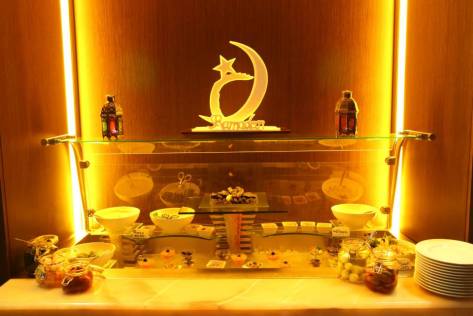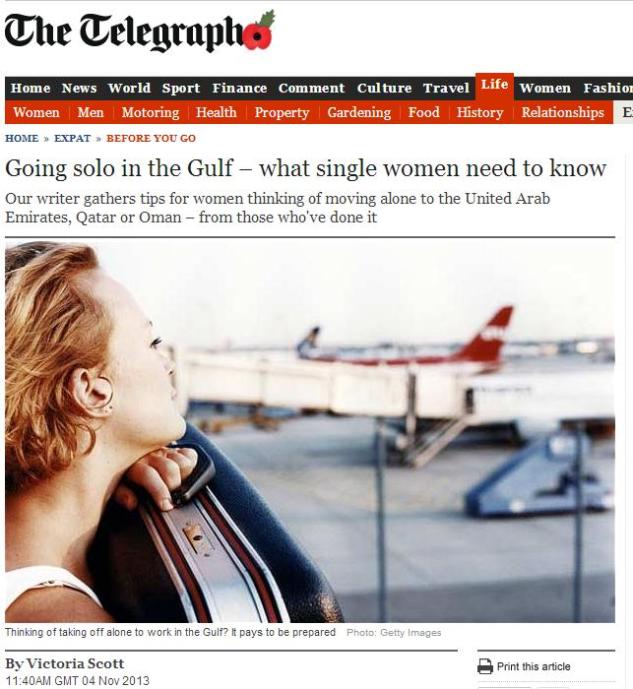Recently, I was commissioned by Telegraph Expat to write an article giving tips to single women who are considering moving to the Gulf to work. They asked me to speak to women about their experiences, and give them 500 words – I ended up writing more than three times that, as the subject was such a broad one.
It’s proved a popular story – it’s the most read in the section currently, and a precis of it was Doha News‘ most read story yesterday.
So far, commentators have suggested that advice about the availability of contraception would have been a good addition (if I’d had the space!) Anything else to add?
Families are the foundation stone of Arab society, and so it follows that the Gulf region is extremely family-friendly. Make the expat move with a spouse and children in tow, and you’ll slot relatively easily into a life filled with play-dates and school runs, and make friends through both.
Beth Howe, a British journalist who lived in Qatar for four years, argued that while the rate of assaults is quite low, harassment is fairly common.
“At some point you’ll probably be followed in your car or at the shopping mall,” she said. “I had my bottom pinched in the supermarket on my very first evening in Doha. My father had lived in the region before me and he told me that if anyone did something like that, I should make a big fuss – so I yelled! The man apologised, then ran off.”
Social life
If your chosen destination is Dubai, winter sun destination par excellence, you’re unlikely to be worried that your free time will be dull. However, the same can’t be said for sleepy Muscat, according to Serena Evans, who lived in Oman for three years.
“It’s a little like Groundhog Day – which one of the five bars shall we go to tonight?” she said. “Lots of socialising takes place at home. The only way to spice things up is to abandon your British stiff upper lip. I heard one person saying to a complete stranger ‘I need some friends, I just got here, fancy going for a drink?’ No shame in that whatsoever.”
Although smaller than Dubai, Abu Dhabi and Qatar also have thriving social scenes, but, as Beth Howe pointed out, there’s life outside of the numerous clubs and bars.
“Now is the time to try something you’ve never done before” she said. “For example, Qatar has an active dive club, or you can take up yoga or have tennis lessons. All of these will make you friends and help you feel socialised.”
Dating
You might be single when you arrive in your new host country, but you might not wish to spend the rest of your life cooking romantic dinners for one. However, given the Islamic faith of the Gulf states, the whole issue of dating is, inevitably, a tricky one. Extramarital sexual relationships are illegal in the region, and kissing in public can also land you in trouble. So, how to negotiate this potential minefield?
“It’s definitely safe to date, but avoid public displays of affection,” advised financial risk manager and TV presenter Rachel Pether, who lives in Abu Dhabi. “It’s also illegal to live with someone of the opposite sex who is not your husband, but the police turn a blind eye to it generally.”
Aside from these concerns, finding a suitable single man also seems to be tricky for many. Despite a glut of dates (40 in just two years in Dubai) Liana Liston, author of blog datingdietingdubai.blogspot.ae, is still looking for love.
“Meeting single men for dating is easy, but finding the right one is hard,” she said. “I’d only recommend living in the Gulf if you would be happy not to meet anyone to marry here. It happens sometimes, but it hasn’t happened to me. That could be my fault, of course!”
Meanwhile, Serena Evans found that tracking down a suitable man in Muscat was “almost impossible”. “There were hardly any single western men in the city,” she said. “And I never dated a local. Omani men, on the whole, are happy to date western women but not to take them home to meet the family.”
Serena also came across many a married man pretending to be single, a point also raised by Beth Howe. “Many have left their wives and wedding vows in their home countries,” she noted, adding that for those who do find a single man to date, the very nature of expat life often leads to heartache.
“The transient nature of this part of the world often leads to relationships ending after a short time, and rather abruptly, and it can all be very painful,” she said.
Dress
In all countries in the region, modesty is the watchword when it comes to dress. Muslim women will feel right at home, but non-Muslims may struggle initially with the adjustment. As a general rule, aim to cover up shoulders and knees, and in some places, clothes covering up to wrists and ankles may be required.
Dubai is the most relaxed city in the region when it comes to clothing, although local campaigners are trying to change these attitudes. Other cities have stricter social rules.
“Abu Dhabi is much more conservative than Dubai,” said Rachel Pether. “I would never show my shoulders or my knees in the office. The beach and night clubs are a different matter, but carry a scarf or cardigan in your bag for a quick modesty check for your journey home.”
Oman is more conservative still, said Serena Evans: “Clothes I thought were appropriate on arrival, I didn’t wear six months in. The more covered I was, the more comfortable I felt. People are not used to seeing bare arms and legs – they stare for novelty, much more, I think, than to be sleazy, which westerners often don’t understand.”
Accommodation
Most of the women we spoke to said that although living alone was a perfectly safe and acceptable option, they felt happier finding a flatmate.
“Living by yourself obviously grants you independence, but parts of life in the Middle East are challenging, so it’s good to have someone to come home to, share a glass of wine, and discuss your day,” Rachel Pether explained.
Serena Evans was the only one of the four women we spoke to who chose to live alone.
“The area I lived in was very expat, and felt very safe” she said. “I had a maid and a part-time gardener. Both were concerned about my safety and looked out for me, but not once did I feel threatened.”
Work
Given the region’s immigration laws, all single women moving to the area will do so for work. All of the women we spoke to enthused about the career opportunities they had, combined with the financial benefit of a tax free salary.
It’s not all plain sailing, however. Serena Evans urged potential expats to take a reality check when considering their new lives abroad.
“Expat life seems very glamorous, but everyone has the same problems that you have at home, just in the sunshine,” she said.
“There were times when it was a normal part of my day to leave work and sit in the car and cry. I’d say that the good points in Muscat far exceeded life in the UK, but the low points were much worse.”
Rachel Pether, however, feels that moving to Abu Dhabi gave her career a real chance to blossom. “One of my favourite parts of the UAE is the emphasis it places on career development,” she said.
“Entrepreneurship and self-development is actively encouraged. Here, more than ever, I feel that it is never too late to become the person I want to be.”
Overall, the top tips from the women we spoke to were:
- Get in touch with someone who already lives there to get an idea of what to expect
- Make sure your employment contract is watertight. Have a contingency plan in case things don’t work out
- Check you have good medical insurance. Local government health care standards are not the same as in the UK, and private care can be expensive
- Make sure you know where to go for emergency medical care as soon as you arrive, and find someone who can act as your local next of kin
- Invest in a few wardrobe staples that will cover your shoulders, elbows and knees
- Consider finding a flatmate to share bills and keep you company





